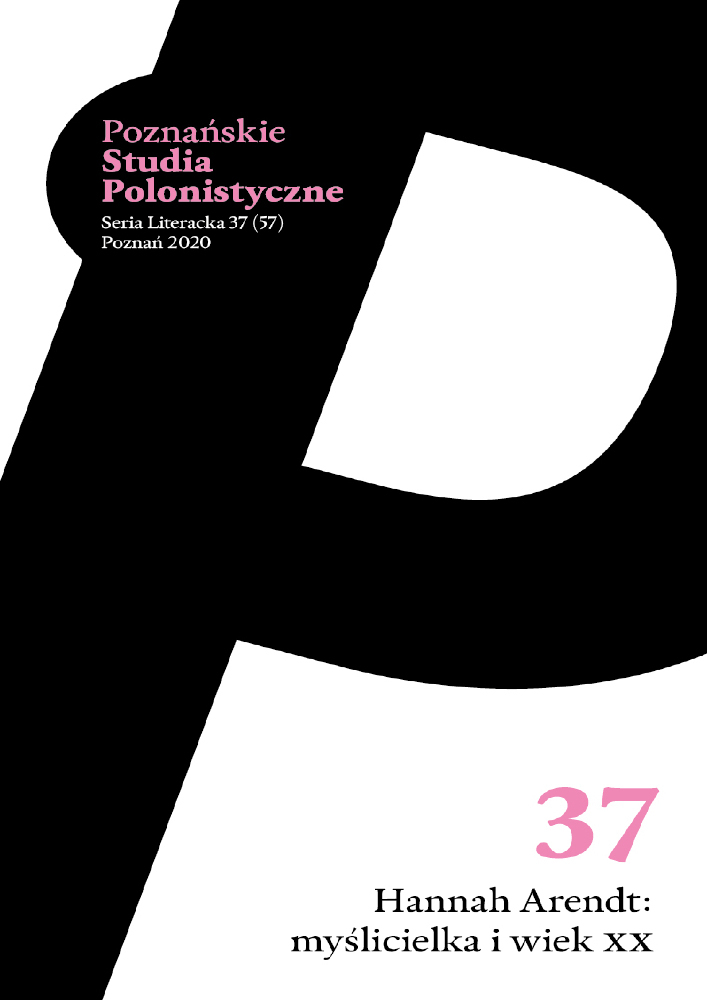Abstrakt
The text deals with the question whether Hannah Arendt was influenced by Franz Rosenzweig’s Der Stern der Erlösung (1921) before writing Der Liebesbegriff bei Augustin (1929). Instead of building general analogies, I studied two very specific topics – the world and birth – to demonstrate that Arendt repeated almost verbatim Rosenzweig’s entire peculiar argumentation which played the notions of God and nature against each other to combat their overwhelming power and to make room for the contingency of the world and the novelty of each birth. Facing the helplessness of a philosophy which ignored mortality, Rosenzweig cried out the lament of the finite being. Philosophy, with its predilection for totality, lost adequate proportions to reflect on life. Arendt revived this paradigmatic reorientation, but with a significant twist: for her, birth and the world meant more than God for Rosenzweig. Both thinkers projected a language between philosophy and theology, inciting the two idioms to a fruitful debate.
Bibliografia
Adler Laure (2005), Dans les pas de Hannah Arendt, Gallimard, Paris.
Arendt Hannah (1996), Love and Saint Augustine, edited and with an interpretive essay by Joanna Vecchiarelli Scott and Judith Chelius Stark, University of Chicago Press, Chicago. (Shortcut: LA)
Arendt Hannah (2002), Denktagebuch. 1950 bis 1973, herausgegeben von Ursula Ludz und Ingeborg Nordmann, in Zusammenarbeit mit dem
Hannah-Arendt-Institut, Dresden, Piper, München.
Arendt Hannah (2007a), The Jewish Writings, edited by Jerome Kohn and Ron H. Feldman, Schocken Books, New York.
Arendt Hannah (2007b), Reflections on Literature and Culture, edited and with an introduction by Susannah Young-ah Gottlieb, Stanford University Press, Stanford.
Bárcena Fernando (2002), Hannah Arendt. Una poética de la natalidad, „Daímon. Revista Internacional de Filosofía”, no. 26, 107-123.
Bensussan Gérard (1998), Hannah Arendt, Franz Rosenzweig et le judaïsme. Acosmie et extra-historicité, „Les Temps modernes”, no. 601, 152-177.
Bernstein Richard J. (1996), Hannah Arendt and the Jewish Question, MIT Press, Cambridge.
Bielik-Robson Agata (2014), Jewish Cryptotheologies of Late Modernity. Philosophical Marranos, Routledge, Taylor & Francis Group, London–New York.
Biss Mavis Louise (2012), Arendt and the Theological Significance of Natality, „Philosophy Compass”, vol. 7, no. 11, 762-771.
Bloom Harold (1973), The Anxiety of Influence. A Theory of Poetry, Oxford University Press, New York.
Brandes Daniel (2010), On Messianic Strains in Arendt’s Theory of Political Action, „Tikvah: University of Toronto Journal for Jewish Thought”, vol. 1, 1-23.
Canovan Margaret (1992), Hannah Arendt. A Reinterpretation of Her
Political Thought, Cambridge University Press, Cambridge–New York.
Cavarero Adriana (2005), For More Than One Voice. Toward a Philosophy of Vocal Expression, translated and with an introduction by Paul
A. Kottman, Stanford University Press, Stanford.
Celermajer Danielle (2011), Hebraic Dimensions of Hannah Arendt’s Thought, „Journal of Modern Jewish Studies”, vol. 10, no. 1, 3-22.
Clarke Barry, and Lawrence Quill (2009), Augustine, Arendt, and Anthropy, „Sophia: International Journal for Philosophy of Religion, Metaphysical Theology and Ethics”, vol. 48, no. 3, 253-265.
Collin Françoise (1999), L’Homme est-il devenu superflue?, Odile Jacob, Paris.
Gordon Peter Eli (2007), The Concept of the Apolitical. German Jewish Thought and Weimar Political Theology, „Social Research”, vol. 74, no. 3, 855-878.
Jonas Hans (2008), Memoirs, edited and annotated by Christian Wiese, translated by Krishna Winston, Brandeis University Press–University Press of New England, Waltham–Hanover.
Knott Marie Luise (2013), Unlearning with Hannah Arendt, translated by David Dollenmayer, Other Press, New York.
Lazier Benjamin (2008), God Interrupted. Heresy and the European Imagination Between the World Wars, Princeton University Press, Princeton.
Leibovici Martine (2003), Hannah Arendt et la tradition juive. Le judaïsme à l’épreuve de la sécularisation, Labor et Fides, Lausanne.
Lütkehaus Ludger (2006), Natalität. Philosophie der Geburt, Graue Ed., Zug.
Magun Artemy (2012), Karl Marx and Hannah Arendt on the Jewish Question. Political Theology as a Critique, „Continental Philosophy Review”, vol. 45, no. 4, 545-568.
Moyn Samuel (2008), Hannah Arendt on the Secular, „New German Critique”, vol. 35, no. 3, 71-96.
Rosenzweig Franz (1921 [5681]), Der Stern der Erlösung, J. Kauffmann Verlag, Frankfurt am Main.
Rosenzweig Franz (2005), The Star of Redemption, translated by Barbara E. Galli, University of Wisconsin Press, Madison. (Shortcut: SR)
Santner Eric L. (2005), Miracles Happen. Benjamin, Rosenzweig, Freud, and the Matter of the Neighbor, w: Slavoj Žižek, Eric L. Santner,
Kenneth Reinhard, The Neighbor. Three Inquiries in Political Theology, University of Chicago Press, Chicago, 76-133.
Young-ah Gottlieb Susannah (2003), Regions of Sorrow. Anxiety and Messianism in Hannah Arendt and W. H. Auden, Stanford University Press, Stanford.
Young-Bruehl Elisabeth (2004), Hannah Arendt. For Love of the World, Yale University Press, New Haven–London.
Zarader Marlène (1990), La dette impensée. Heidegger et l’héritage hébraïque, Éditions du Seuil, Paris.
Licencja
Autorzy
Autorzy tekstów przyjętych do publikacji w czasopiśmie „Poznańskie Studia Polonistyczne. Seria Literacka” są zobowiązani do wypełnienia, podpisania i odesłania na adres redakcji umowy o udzielenie nieodpłatnej licencji do utworów, z zobowiązaniem do udzielania sublicencji CC.
Zgodnie z umową, autorzy tekstów opublikowanych w czasopiśmie „Poznańskie Studia Polonistyczne. Seria Literacka” udzielają Uniwersytetowi im. Adama Mickiewicza w Poznaniu niewyłącznej i nieodpłatnej licencji oraz zezwalają na użycie sublicencji Creative Commons Attribution-NoDerivatives 4.0 International (CC BY-ND 4.0).
Autorzy zachowują prawa do dalszego, swobodnego rozporządzania utworem.
Użytkownicy
Zainteresowani użytkownicy internetu uprawnieni są do korzystania z utworów opublikowanych od 2016 roku w „Poznańskich Studiach Polonistycznych. Serii Literackiej” pod następującymi warunkami:
- uznanie autorstwa – obowiązek podania wraz z rozpowszechnionym utworem, informacji, o autorstwie, tytule, źródle (odnośniki do oryginalnego utworu, DOI) oraz samej licencji;
- bez tworzenia utworów zależnych – utwór musi być zachowany w oryginalnej postaci, nie można bez zgody twórcy rozpowszechniać np. tłumaczeń, opracowań.
Do wszystkich tekstów opublikowanych przed 2016 r. prawa autorskie są zastrzeżone.
Inne
Uniwersytet im. Adama Mickiewicza w Poznaniu zachowuje prawo do czasopisma jako całości (układ, forma graficzna, tytuł, projekt okładki, logo itp.).
